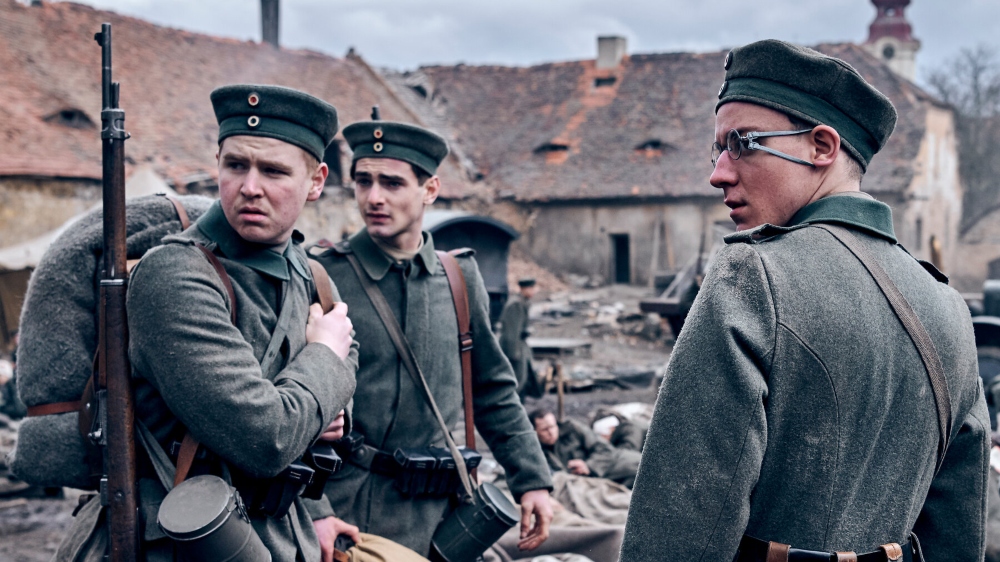On Jan. 24, Riz Ahmed and Allison Williams read out the names of all the movies and artists nominated for an Oscar at the 95th Academy Awards, which will be held on March 12. Among the nominees for Best International Feature were four European films and one Argentinian movie that may as well be European.
Best International Feature is the Academy’s recently-renamed award for movies outside of the English language. It was first awarded competitively to Fellini‘s La Strada in 1957. This year’s candidates range in subject matter from Nuremberg-style war crime tribunals to teenage angst, a bloody war epic, and a roving donkey in search of a family.
Read on for our capsule reviews of the five nominees for Best International Feature followed by a quick handicap of their Oscar chances:
All Quiet on the Western Front (Germany) – Edward Berger’s remake of the 1930 Best Picture winner — Germany’s first serious attempt at adapting Erich Maria Remarque‘s once-banned anti-war novel — is a guttural, stunning reimagining of a timeless classic. Like the book, the film follows young Paul Baumer (Felix Kammerer) after he enlists in the Imperial German Army sometime during World War I and encounters the unimaginable horrors of armed conflict. The story’s parallels mostly end there, as the point of this narrative is just as much the journey as it is the destination.
From the outset, it is clear that nothing good is in store for Baumer and his cadre of ingenue companions, all of whom have been inebriated by the promise of natural glory and whose sobering moments come cruelly and unforgivingly. In this version, the director also follows Matthias Erzberger (Daniel Bruhl), the German commander tasked with negotiating an armistice towards the end of the Great War, while omitting Baumer’s brief journey back to the Fatherland where he finds the youth still inexplicably enamored with the idea of losing their lives or limbs for their country.
The story turns out as shocking and gruesome as it has ever been. Its majesty, though, lies in Berger’s deft deployment of below-the-line talent, including sweeping and darkened landscapes courtesy of Cinematographer James Friend, pulsating sound, and an unapologetically somber and cruel score by Volker Bertelmann, plus gruesome makeup, and meticulous production design. All of these remarkable efforts are up for Oscars and several are likely to win, as All Quiet on the Western Front is one of the most visceral and powerful German movies to contend at the Academy Awards in two decades.
Grade: A
Argentina, 1985 (Argentina)- As its title would suggest, Argentina’s Oscar-nominated film takes place in the middle of the ’80s at a time when the country’s post-military dictatorship civilian order struggled to find closure by bringing to justice those responsible for the humans rights atrocities of the two decades prior.
Santiago Mitre‘s film follows an ambitious, straight-arrowed prosecutor tasked with the unenviable task of bringing the criminal colonels to justice. Ricardo Darin stars as the zealous lawman, as he starred in the last Argentine film to take home this Oscar — The Secret in Their Eyes, which won back in 2009. His latest film is interesting as far as the plot goes, and in terms of its below-the-line values, the film’s makeup and hairstyling are more than acceptable, as are its costume and production design.
But if the point of Mitre’s script is to emulate classic war legal dramas like, say, Judgment at Nuremberg, he fell well short. Too much comedy infuses the otherwise somber proceedings, leaving the film stuck between the quirkiness and youthful optimism of the do-gooder government lawyers and the tear-jerking moments of testimony from the “Madres de Mayo” (the names for the group of mothers of torture victims). Those into political courtroom dramas will enjoy most of the proceedings, but others will likely pass, and I can’t blame them.
Grade: B

Close (Belgium) – Young Belgian director Lukas Dhont returns with this follow-up to his transgender youth movie Girl. In Close, Dhont follows teenage best friends Leo and Remi, and the tragedy that befalls them when one reacts negatively to being teased at school over the idea that the two may be more than just platonic friends. The film deals with matters of sexuality, friendship, teen bullying, anxiety, and loss, but it never quite coalesces around a particular narrative or purpose in the way that Dhont’s directorial debut did.
The young actor who plays Leo is emotionally persuasive, but the script itself is not, leaving out major and critical pieces of information that would explain to the viewer why Leo or Remi would behave as they eventually do. Close will yank at your heartstrings and make you feel remarkably uncomfortable. And though pointless suffering is perhaps half of the point of award-nominated films, Close ventures too far afield from any sympathetic characters to make it worth your while.
Grade: C+
EO (Poland) – Legendary Polish director Jerzy Skolimowski, who is in the seventh decade of his illustrious career, returns after a seven-year hiatus with the quirky, unique, and ultimately touching road drama EO. The twist is that the title refers to a roving donkey that escapes an unhappy life of capture to roam through the Polish countryside in search of a family. Clearly, the story is inspired by Dostoyevsky’s The Idiot, about a donkey who is given to a series of callous and cruel owners. This version is slightly less unforgiving, with EO passing through owners of varied moral compasses. Some treat him kinder than others, but through the lens of their lives, he quietly discovers the simple beauty of his own.
Below the line, EO features beautiful, mostly predawn cinematography and a playful score that ambles across the landscape with the little ass, leavening most of the proceedings — even those moments where the titular animal is in peril or being mistreated. EO may ultimately be a simpler tale than that which inspired it, but it is just as memorable and twice as moving. Dostoyevsky may have effectively conveyed the cruelty of humankind through the eyes of an animal, but Skolimowski’s take on this tale dares to imagine that some hope is possible, at least in the journey, if not the destination.
Grade: B+
The Quiet Girl (Ireland) – Irish director/screenwriter Colm Bairead‘s coming-of-age drama is as soft as its titular girl, and it turns out to be one of the most powerfully moving films of the year. Set in 1981, the story follows young Cait, a quiet young girl who lives in a disjointed home that is organized around the chaotic selfishness of her parents. Their cruel quietness towards her has left her anxious, silent, and ill at ease. Unwanted, she is sent to live with distant relatives in the Irish countryside while her mother gets through her latest ill-advised pregnancy.
In her new abode, Cait resides with a childless couple that milks cows and tends to a farm. The mother is loving and understanding while the father is stern and dictating — at least at first. Cait slowly warms up to them — and them to her — in this peaceful family drama about the power of human connection and selflessness.
Below the line, the film acquits itself marvelously with the early 1980s settings and wardrobe, though the production values are as unambitious as the shy young woman at the center of the proceedings. Still, don’t confuse discretion with passivity, because both Cait and The Quiet Girl speak with one of the loudest voices this award season by the time all is said and done, garnering Ireland its well-earned first-ever Oscar nomination in this category.
Grade: A-

Oscar Handicap: For all the controversy surrounding the surprise Best Actress nomination for Andrea Riseborough and the persistent conversation about race at the Oscars, few ever discuss another form of persistent obstreperousness by the Academy — its obsessively Eurocentric focus on movies when it comes to the Oscar for Best International Feature Film.
Throughout its history, and including honorary Oscars, this award has gone to European movies 57 out of 74 times, even though non-European movies do not dominate the ranks of the submissions to nearly that degree. This year is no different, with four movies hailing from Europe directly and a fifth — Argentina’s — featuring a story that may as well have come out of a Spanish procedural drama.
What explains the Academy’s narrow focus on films from the Old Continent? Familiarity, more than anything, is the likely culprit, but the innocent nature of the explanation does not make it any less insidious as the organization’s pedestrian, rather narrow taste is on full display when one analyzes the typically easy-to-swallow movies that get rewarded, even within this space. This is all to say, the Academy being woefully unable to look outside itself is an endemic problem, one that is too complex to be explained simply by racial bias or any other reductive reasoning.
All of that aside, it is not difficult to predict which film will win the Oscar on March 12. In the 10 or so instances in which a movie vying for this award has also been nominated for Best Picture, that film has never, ever failed to take home the Best International Feature statue. Indeed, with the permanent expansion to 10 nominees in the Best Picture category, the last four International Feature winners have constituted movies nominated in either that category or other major ones such as Best Director (Drive My Car, Another Round, Parasite, and Roma).
This year, that translates to an easy win for Germany’s All Quiet on the Western Front, which will be that country’s third competitive win. Argentina’s movie, which won the Globe, is likely in second place, but the South American country will likely remain in search of its third Oscar in eight nominations. Belgium, meanwhile, will likely go home emptyhanded for the eighth time — the second most of any nation after Israel, while Poland will lose for a 12th time, though it did convert Ida‘s nomination into an Oscar back in 2014. Lastly, I imagine that Ireland is just glad to have finally made it to the final five after beginning their quest for this Oscar with Gaelic films in 2007.
Will Win: All Quiet on the Western Front, Germany
Could Win: Argentina, 1985, Argentina
Should Have Been Nominated: Bardo, False Chronicle of a Handful of Truths, Mexico
The 95th Academy Awards will be held on March 12, 2023. Click here for a full list of this year’s Oscar nominees.





